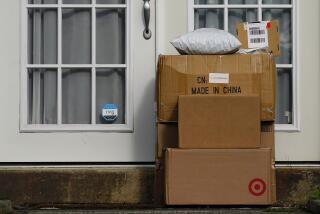Software Pirates Lurk Behind Pin-Striped Suits : Computers: Corporate theft of programs has reached such epic proportions that makers have formed their own investigative team.
- Share via
WASHINGTON — From a modern office building on Pennsylvania Avenue, a bespectacled, youngish lawyer and his six-person crew search the world for pirates.
They find them at some of the most respected businesses--corporate officials who are consciously plundering $12 billion worth of goods each year. In other words, software pirates.
“We’ve raided some of the largest corporations in the world,” said Robert Holleyman, 38, president of Business Software Alliance. “Otherwise legitimate businesses buy 100 PCs (personal computers) and five pieces of software.”
Then they copy the software to make the rest of the computers run. Under a federal law passed late last year, pirates of 10 or more copies of copyrighted software valued at more than $2,500 now face up to five years in jail and $250,000 in fines.
But Holleyman’s sponsors, the companies that make computer software, hire him to protect their copyright. And usually they’re willing to settle out of court if the offender replaces the pirated software with the legitimate stuff.
“They wouldn’t think of stealing the PC,” said Holleyman. “They see a PC and it is big and bulky and they understand why this is of value.”
Pirates also lurk in computer retail stores where, according to Holleyman, some dealers offer to load a computer with software at no charge if the customer buys the hardware.
In some countries, retailers openly sell software reproductions over the counter. And throughout the world, computer bulletin boards are a source of pilfered programs, says Holleyman.
Almost every business in the United States and the bigger ones of the world use computers. Virtually all the computers in this country and 75% of them in the rest of the world run on American-made software.
Many don’t pirate software. But it happens often enough to keep Holleyman’s operation moving.
He works on tips from corporate insiders and computer users. And he runs a hot line for anyone with questions about software laws that also gathers information from informants.
Besides stealing, illegal software dealers are endangering computer health, he says, noting a persistent link between the spread of computer viruses and the illegal distribution of software.
His efforts to find and destroy piracy are backed by the giants of business software--Microsoft, Lotus Development, Aldus, Apple Computer, Autodesk, Borland International, Novell and WordPerfect.
They represent 71% of the $6-billion-a-year business enjoyed by American software makers.
In December, BSA announced 37 legal actions in 10 European countries, bringing to more than 150 the total actions on the continent since the alliance formed in 1987.
A raid on a bulletin board operation in Baltimore, Md., last October was followed by a sweep the next month of 13 similar operations in Berlin.
While BSA goes after pirates of business software, the Software Publisher’s Assn. pursues thieves in the smaller, game-makers market.
Their common problem is that their products can be duplicated perfectly by anyone who knows how to operate a computer and sent in minutes across the phone lines anywhere in the world.
Countries in Europe and Asia are also cracking down with new laws backed up by fines and prison terms.
In a typical raid, Holleyman appears at a company’s door with a search warrant, the police and specially trained teams of lawyers and technicians. They fan out through the firm checking each desk computer for bootlegged software.
The raid in Baltimore uncovered 500 illegal software programs that could be downloaded from a computer bulletin board known as APL.
In Berlin, investigators seized 25 computers containing six gigabytes of illegally obtained software. That’s about a billion words, or 2 million typewritten pages of information.
The operations had distributed copies of more than 25 different computer programs to cities throughout Germany, some obtained from illegal bulletin boards in the United States.
More to Read
Sign up for Essential California
The most important California stories and recommendations in your inbox every morning.
You may occasionally receive promotional content from the Los Angeles Times.













